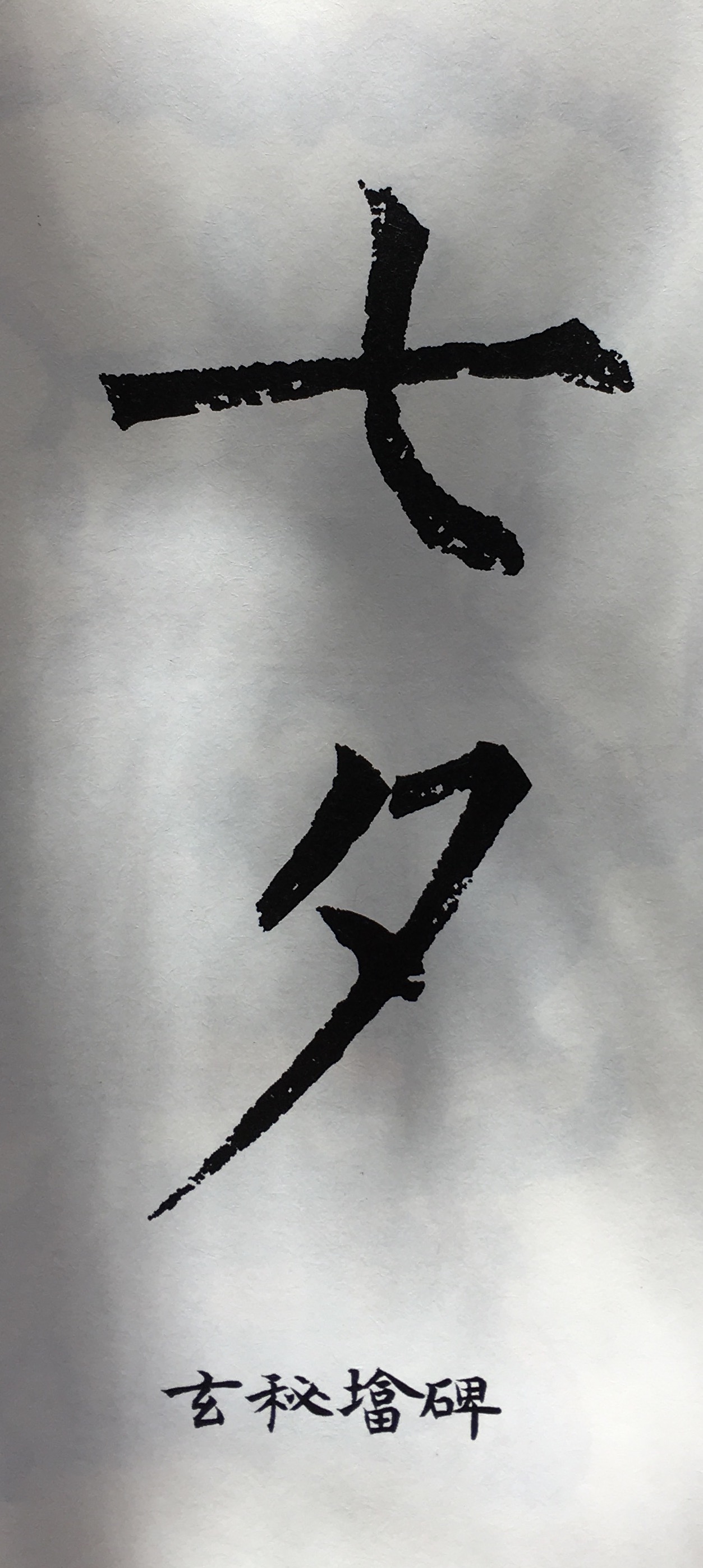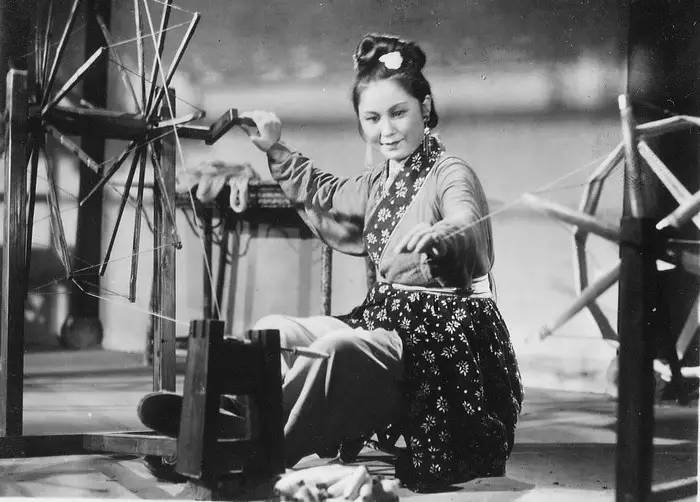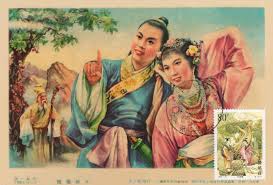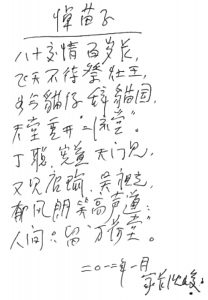Separation from loved ones, reuniting with old friends, the reunion of families, happy couples, the sorrow of missed opportunities, anger over frustrated missteps in life… . These are all themes in Chinese culture reflected in such expressions as: 生死離別、悲歡離合、陰差陽錯、 兩地相思、 兩地分居、月圓之夜、月圓花好, and so on.
The Seventh Day of the Seventh Month of the Chinese lunar calendar marks the fleeing moment when the star-crossed lovers — the Cowherd 牛郎 and the Weaving Maiden 織女, separated through the year by an angry fate, and the Milky Way — are able to meet for a night on a bridge of magpies.
The Double Seventh Festival originated in beliefs and practices that predate the Western Christian era, and traces of it have even been found in the ancient Book of Songs. In recent times, as faux tradition has flourished under the aegis of state patronage and with the support of mass commercialisation, the festival has generated a measure of controversy. Although, as we will see below, it is also known as the Festival Beseeching Dexterity 乞巧節, marking as it does the handiwork of girls in sewing and weaving, it is now promoted as China’s indigenous answer to the Valentine’s Day of the West. Meanwhile, mawkish neo-traditionalists argue that the meeting of the long-separated Cowherd and Weaving Maiden has nothing to do with lover’s trysts. Rather it should be seen as a celebration of conjugal loyalty, not of connubial pleasure.
***
The annual Meeting of the Cowherd and the Weaving Maiden on a Bridge of Magpies has, from the twentieth century, became one of China’s Four Classical Folktales. They are:
- Meng Jiangnü Topples the Wall with Tears 孟姜女哭倒長城;
- The Cowherd and the Weaving Maiden Meet on Magpie Bridge 牛郎織女鵲橋會;
- The legend of Liang Shanbo 梁山伯 and Zhu Yingtai 祝英台; and,
- The story of the White Snake 白蛇傳.
For more on these folktales, and their recasting in modern times, see Wilt L. Idema, Old Tales for New Times: Some Comments on the Cultural Translation of China’s Four Great Folktales in the Twentieth Century, Taiwan Journal of East Asian Studies 9, 2012, no. 1 (Issue 17): 1-23.
This is the latest in our series of New Sinology Jottings 後漢學劄記.
— Geremie R. Barmé, Editor, China Heritage
Seventh Day of the Seventh Month of the
Dingyou Year of the Rooster 2017
丁酉雞年七月七日七夕節

Laying Down of Needles 丟針
On the seventh day of the seventh month girls of Peking each take a bowl of water which they expose to the sun, and put in it a small needle so that it will float on the surface of the water. They then long watch the needle’s shadow at the bottom of the water. Sometimes it is diffused as if in the shape of flowers, sometimes in movement like clouds, sometimes fine like a thread, or sometimes thick like a stick. [Thus a shadow thick like a stick would indicate that the girl is clumsy at needlework, whereas one fine like a thread would show the reverse.] By this means they can predict each girl’s dexterity of clumsiness. This is commonly called the laying down of needles.
Bridge Formed of Magpies 鵲橋
On the seventh day of the seventh month, if the moon is clear, the crows and magpies appear flying and calling a little later than usual, and it is commonly said that they have been away forming a bridge.
Note: This has reference to an old legend, according to which the celestial Spinning Damsel (identified with the constellation Lyra) was banished from Heaven for a certain period and sent to earth. There she met the Oxherd (identified with the constellation Aquila), whom she married. They lived happily together until the time when her banishment came to an end, when she was forced to return to Heaven. The Oxherd tried to pursue her, only to be stopped in his progress by the Heavenly River (Milky Way), and since that time the lovers have been permitted to see each other only once a year, on the seventh day of the seventh month, when the magpies are supposed to form a bridge across the Milky Way over which the two may pass. But if on that day it rains, they are doomed to wait another year before meeting. A play representing this lovely legend is usually given on this day.
According to the Rixia jiuwen kao, during the Jin (1115-1234) and Yuan (1280-1367) dynasties the courtiers of the Palace would wear (embroidered) insignia of a magpie bridge. … But the present dynasty [the Qing], with its august frugality, has not revived such childish forms of amusement.
— from Tun Li-ch’en, Annual Customs and Festivals in Peking
as recorded in the Yanjing suishiji 燕京歲時記,
trans. and annotated by Derk Bodde,
Peip’ing: Henri Vetch, 1936, p.59.
Romanised words have been converted to Hanyu pinyin.

Poem Ten in the Nineteen Old Poems 古詩十九首
Author Unknown, Second Century CE
Far in the skies is the Cowherd Star:
Bright on the Milky Way the Maid*
Lightly her snowy fingers raises
Jogging her shuttle through its mazes.
But her stint of work is never-ending,
And her tears like sobbing showers descending.
Though clear and shallow the Milky Way,
Never they’ll meet for many a day.
No word she says, but stares dismayed,
Alone by that surging River far.
迢迢牽牛星,
皎皎河漢女。
纖纖擢素手,
札札弄機杼。
終日不成章,
泣涕零如雨。
河漢清且淺,
相去復幾許?
盈盈一水間,
脈脈不得語。
* In the beginning of time, the Cowherd and the Weaving-maid loved each other so well that they neglected their work and were changed into stars by the Lord of Heaven, and stationed at either side of the Milky Way in Aquila and Lyra respectively. The lovers are permitted to meet once a year, when the wings of magpies provide a bridge for them to cross.
— translation and note by Burton Watson
Presented to Wei Ba, Gentleman in Retirement 《贈衛八處士》
Du Fu 杜甫 (712-770)
Life is not made for meetings;
like stars at opposite ends of the sky we move.
What night is it, then, tonight,
when we can share the light of this lamp?
Youth — how long did it last?
The two of us grayheaded now,
we ask about old friends — half are ghosts;
cries of unbelief stab the heart.
Who would have thought?‚ twenty years
and once again I enter your house.
You weren’t married when I left you;
now suddenly a whole row of boys and girls!
merrily greeting their father’s friend,
asking me what places I’ve been.
Before I finish answering,
you send the boys to set out wine and a meal,
spring scallions cut in night rain,
new cooked rice mixed with yellow millet.
Meetings are rare enough, you say;
pour the wine till we’ve drowned ten cups!
But ten cups do not make me drunk;
your steadfast love is what moves me now.
Tomorrow hills and ranges will part us,
the wide world coming between us again.
人生不相見,
動如參與商。
今夕復何夕,
共此燈燭光。
少壯能幾時,
鬢髮各已蒼。
訪舊半為鬼,
驚呼熱中腸。
焉知二十載,
重上君子堂。
昔別君未婚,
兒女忽成行。
怡然敬父執,
問我來何方。
問答未及已,
驅兒羅酒漿。
夜雨剪春韭,
新炊間黃粱。
主稱會面難,
一舉累十觴。
十觴亦不醉,
感子故意長。
明日隔山嶽,
世事兩茫茫。
— translated by Burton Watson
***
For a rendition of Du Fu’s poem by the contemporary balladeer Zhou Yunpeng 周雲蓬, recorded in Paris, see:
The 2009 documentary film Last Train Home 歸途列車 by Fan Lixin 範立欣 depicts the annual ‘Spring Tide’ 春潮, or the mass movement of workers returning home for the Spring Festival Lunar New Year. It is a period that has taken on the celebration and sorrows of the Seventh Day of the Seventh Moon.
***
In the Maoist era, the state had power over not only how people lived, but where they lived. The ructions of constant political movements and purges resulted in countless separations; couples and families were torn apart according to Party need, whim and as a punishment. A new language of estrangement and loneliness evolved, and the old metaphors and tropes of traditional exile and poetry re-emerged.
The playwright Wu Zuguang 吳祖光, who was exiled from his family for long periods from the 1950s, summed up his heartbreak at being separated from his wife, the former opera star Xin Fengxia 新鳳霞, in a simple poem composed on the Seventh Day of the Seventh Month in 1972:
The sky jade bright on the Seventh Night,
The Milky Way an impassable torrent of tears.
Stern Fahai is victorious over the Mother Goddess;
Yearlong the Cowherd and Weaving Maid ne’er can meet.
七夕夜色明如玉,
一帶銀河淚似泉;
法海於今勝金母,
年年牛女不團員。
A Marriage Made in Heaven
In 1955, as the new Communist government of China, building on efforts made during the Republic (1912-1949) to modernise and nationalise Chinese culture, Married to a Heavenly Immortal 天仙配, a Huangmei-style opera from Anhui 安徽黃梅戲 was adapted for the screen. Directed by Shi Hui 石揮 and starring Yan Fengying 嚴鳳英 and Wang Shaofang 王少舫, it was an immediate success and proved to be one of the most popular Chinese-language films of the 1950s. For the film, produced by the Shanghai Film Studio, see:

Note:
Wilt L. Idema offers an extended discussion of this opera, the film adaptation and the rather convoluted relationship between the Twenty-Four Exemplars of Filial Piety 二十四孝 and the story of the Oxherd and the Weaving Maiden in ‘The Emergence of Regional Opera on the National Stage’, in David Der-wei Wang, ed., A New Literary History of Modern China, Cambridge, Ma.: Belknap Press / Harvard University Press, 2017, pp.585-590.
Postscript
Linda Jaivin and I were married in Beijing in 1986, and we celebrated our nuptials on the Seventh of July that year, close enough to The Seventh Eve, albeit we were all calculating things by China’s revolutionary Western calendar.
Hsien-yi 楊憲益 and Gladys Yang held a party for our Chinese friends at their apartment in the Foreign Languages Press compound at Baiwan Zhuang. Over the years, these friends had acted as our Bridge of Magpies. They included Wu Zuguang 吳祖光, Xin Fengxia 新鳳霞, Huang Miaozi 黄苗子, Yu Feng 郁風, Shen Jun 沈峻 (on behalf of herself and Ding Cong 丁聰), Yan Wenjing 嚴文井, Hua Junwu 華君武 and Yang Jiang 楊絳. Some of them had been members of The Layabouts Lodge 二流堂;* they had all suffered the capricious separations common in the first three decades of the People’s Republic. Much was made of the symbolism of the Double Seventh and hard-won reunions in the gifts, poems and the paintings they lavished upon us.
Zuguang, who had the use of a stretch limousine for the weekend as a treat from a wealthy friend, urged us to avail ourselves of that grand palanquin. We were chauffeured around Beijing, and Tiananmen Square, in a state of delirious delight while toasting our union with flat, warm Chinese orange pop in cut crystal glasses.
That was another time; all of those dear friends are now themselves part of our firmament. Linda and I are long since separated and apart from these feeble words, and tender memories, there is no bridge across which we might meet with them again.
— GRB
* Following Miaozi’s death in January 2012, Shen Jun composed a light-hearted epitaph in the doggerel style that members of The Layabouts Lodge used when exchanging poems:

悼苗子
八十交情百歲長,
飛天不待祭灶王,
如今貓仔辭貓園,
天堂重開二流堂。
丁聰憲益天門見,
又見唐瑜吳祖光,
郁風朗笑高聲道:
人間只留萬荷堂。
The Hall of Lotuses 萬荷堂 is the name of the artist Huang Yongyu’s 黃永玉 studio.
Shen Jun passed away in December 2014.

